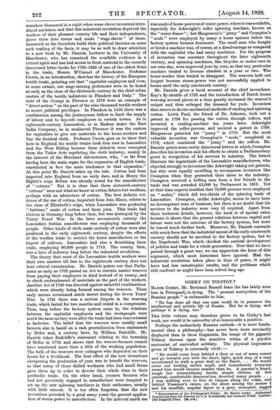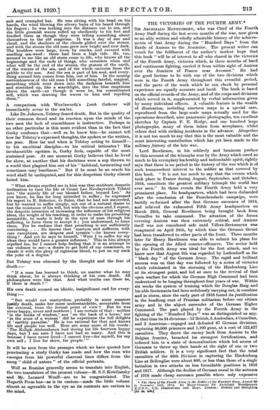GORKY ON TOLSTOY.* Mexim GORKY, Mr. Bertrand Russell fears (he
has lately seen him in Petrograd), is dying. The " present martyrdom of the Russian people" is unbearable to him.
" He has done all that one man could do to preserve the intellectual and artistic life of Russia. But he is dying, and perhaps it is dying, too."
This little volume may therefore prove to be Gorky's last work, nor would it be unworthy of so honourable a position.
Perhaps the melancholy Russian outlook—it is more funda- mental than a philosophy—has never been more succinctly displayed than in these fragments, the image of the gigantic Tolstoy thrown upon the sensitive retina of a psychic anatomist '.of unrivalled subtlety. The physical impression given of Tolstoy is extremely vivid :-
" He would come from behind a door or out of some corner and go towards you with the short, light, quick step of a man accustomed to walk a great deal on the Ear th. . . . He would come out looking rather small, and immediately everyone round him would become smaller than he. A peasant's beard, rough but extraordinary hands, simple clothes, all this external, comfortable democratism deceived many people.. . I was walking over to him at Gaspra along the coast, and behind Yussupor's estate, on the shore among the stones I saw his smallish, angular figure in a grey, crumpled, ragged • Reminiscences of Leo Niselayecite+ Tolstoi, By Maxim Gorky. Authorized Translation from the Russian by S. S. Kotellansky and Leonard Woolf. London : The Hogarth Press. Las. net.) suit _and crumpled hat. He was sitting with his head on hia hands, the wind blowing the silvery hairs of his beard through his fingers ; he was looking into the distance out to sea, and the little greenish waves rolled up obediently to his feet and fondled them as though they were telling something about themselves to the old magician. It was a day of sun and cloud, and the shadows of the clouds glided over the stones, and with the atones the old man grew now bright and now dark. The boulders wore large, riven by cracks, and covered with smelling sea-weed : there had been a high tide. He, too, seemed to me like an, old stone come to life, who knows all the beginnings and the ends of things, who considers when and what will be the end of the -stones, the grasses of the earth, of the waters of the sea, and of the whole universe from the pebble to the sun. And the sea is part of his soul, and every- thing around him comes from him, out of him. In the musing motionlessness of the old man I felt something fateful, magical, something which went down into the darkness beneath him and stretched up, like a searchlight, into the blue emptiness above the earth—as though it were he, his concentrated will, which was drawing the waves to Yam and repelling them."
A comparison with Wordsworth's Leech Gatherer will immediately occur to the reader.
Like Dr. Johnson, Tolstoy feared death. But in the quality of their common dread and its reaction upon the minds of the two men the lack of resemblance is instructive. Perhaps in no other particular is this more evident than in the fact that Gorky confesses that—well as he knew him—he cannot tell how far Tolstoy's expressed thoughts, the spoken or the written, are pose. How far and when is Tolstoy acting to himself— to his uncritical disciples—to his critical intimates ? His inexhaustible egotism is, Gorky feels, capable of the most sustained pose. At one moment Gorky believes that he lived for show, at another that his doctrines were a sop thrown to a world that plagued him out of his " habitual, tormenting and sometimes cosy loneliness." But if he must be an oracle his word shall be undisputed,and for this despotism Gorky almost hated him.
" What always repelled me in hini was that stubborn despotic inclination to turn the life of Count Leo Nicolayevitch Tolstoi into the saintly life of our blessed father, boyard Leo.' As you know, he has for long intended to suffer ; he expressed his regret to E. Soloviov, to Suler, that he had not succeeded, but he wanted to suffer simply, not out of a natural desire to test the resistance of his will, but with the obvious and, I repeat, the despotic intention of increasing the influence of his religious ideas, the weight of his teaching, in order to make his preaching irresistible, to make it holy in the eyes of man through his suffering, to force them to accept it ; you understand, to force them. For he realizes that that preaching is not sufficiently convincing. . . . He knows that martyrs and sufferers, with rare exceptions, are despots and tyrants '—he knows every- thing ! And yet he says to himself, Were I to suffer for my ideas they would have a greater influence.' This in him always repelled me, for I cannot help feeling that it is an attempt to use violence to me—a desire to get hold of my conscience, to dazzle it with the glory of righteous blood, to put on my neck the yoke of a dogma."
But Tolstoy was obsessed by the thought and the fear of death :—
" If a man has learned to think, no matter what he may think about, lie is always thinking of his own death. All philosophers were like that. And what truths can there be, if there is death I " His own death seemed an idiotic, insignificant end for every- thing:— "But would not martyrdom probably in some measure justify death, make her more understandable, acceptable from the external, from the formal point of view / But he was never happy, never and nowhere ; I am certain of that : neither ' in the books of wisdom,' nor on the back of a horse,' nor in the arms of a woman ' did he experience the full delights of earthly paradise.' He is too rational for that and knows life and people too well. Here are some more of his words : The Kaliph Abdurahman had during his life fourteen happy days, but I am sure I have not had. so many. And this is because I have never lived—I cannot live—for myself, for my own self ; I live for show, for people.' "
It will be seen from the passages which we have quoted how penetrating a study Gorky has made and how the man who emerges from his powerful charcoal lines differs from the smug " child of nature " of the official portraits.
Well as Russian generally seems to translate into English, the two translators of the present volume—M. S. S.Koteliansky and Mr. Leonard Woolf—are to be congratulated. The Hogarth Press has—as is its custom—made the little volume almost as agreeable to the eye as its contents are curious to the mind.



































 Previous page
Previous page